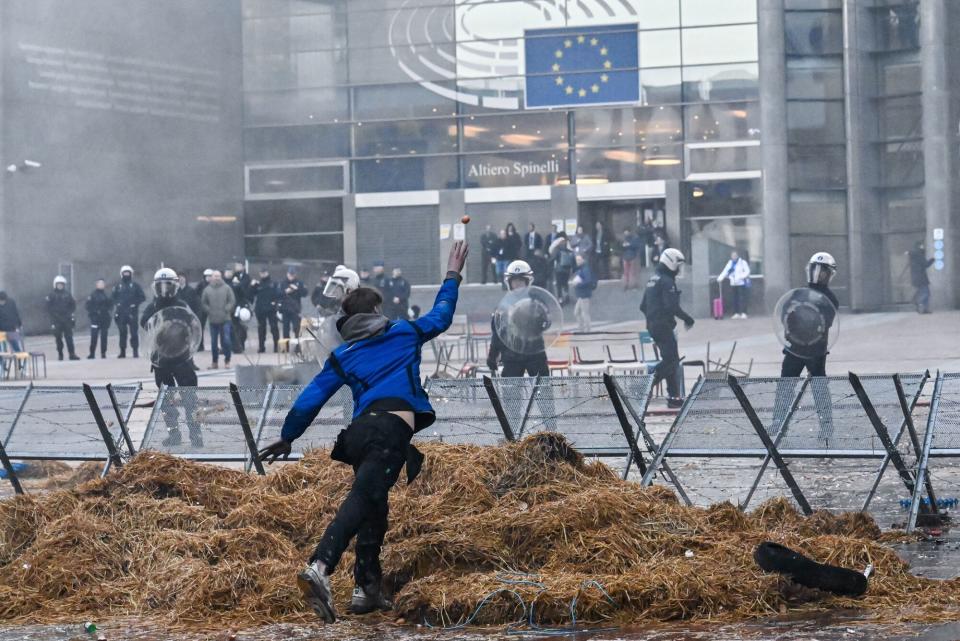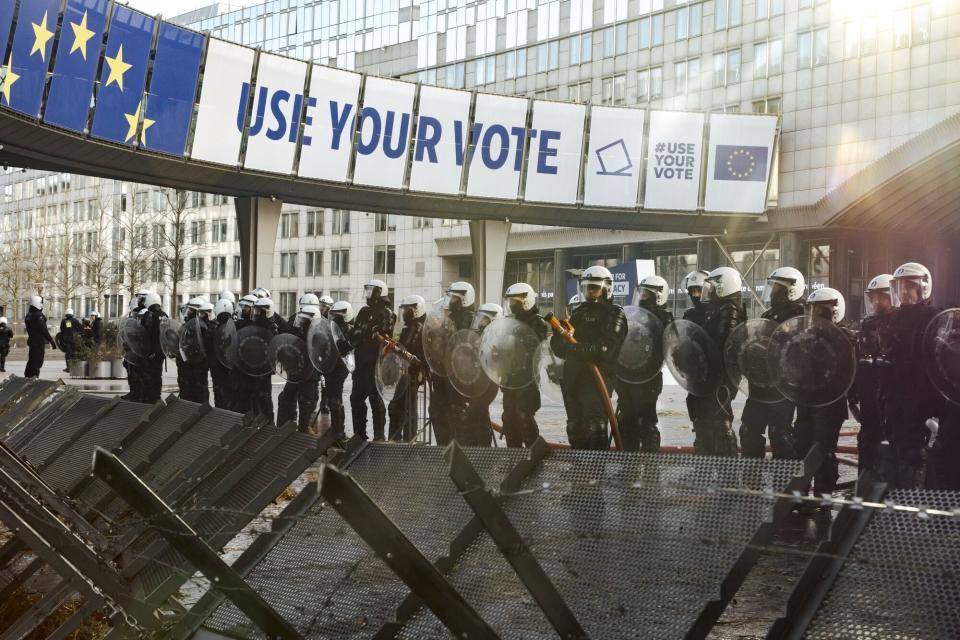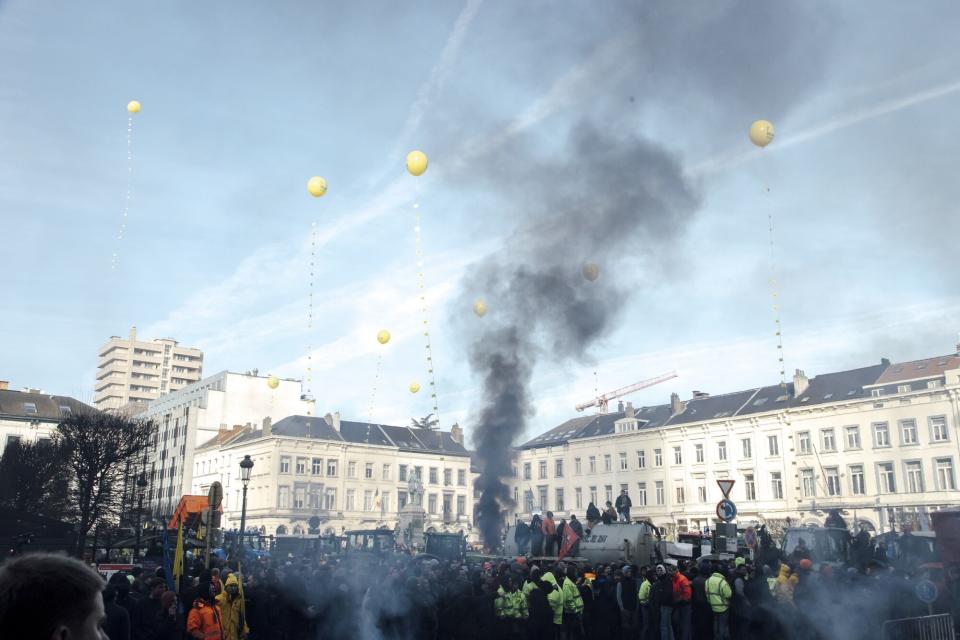Farmers Bring Protests to Brussels as EU Leaders Meet Nearby
- Oops!Something went wrong.Please try again later.
(Bloomberg) -- At least 1,300 tractors clogged streets in Brussels near European Union institutions Thursday morning as farmers staged a protest aimed at the bloc’s leaders meeting nearby for a summit.
Most Read from Bloomberg
Donald Trump Loses London Case Against Ex-MI6 Spy Over Kremlin Dossier
QQQ Up in Late Trading as Meta Soars, Apple Falls: Markets Wrap
The demonstration is part of a broader wave of protests by farmers in France and across Europe over what they describe as unfair competition from abroad, plans to cut subsidies and planned EU regulations.
“We are here today to protest against the European system of farms,” said Kevin, a farmer from outside Brussels who only gave his first name. “Because the way the European Parliamentarians are respecting us or are treating us is not the way it has to be. Farming has to be doing our job with the animals, on the fields, and not sitting all day behind the desk to look at papers.”
Cristina Brizzolari, a 48-year-old rice farmer from Novara in northern Italy, said she and her team came to Brussels to make clear that while they support climate-related goals, they can’t be at the expense of the agricultural sector.
“We don’t want them to make the problems we already have worse,” she said.
Farming issues aren’t on the agenda of Thursday’s leaders summit, but the topic may come up informally with governments worried that the protests could spread.
On Wednesday, the EU delayed plans that would require farmers to leave more of their land fallow, one of the key demands from French farmers’ unions, and said poultry, eggs and sugar coming from Ukraine will remain tariff-free only up to the average volumes imported in 2022 and 2023. France, meanwhile, has pledged to continue granting concessions to farmers after two weeks of protests.
“Sometimes I have the feeling that we over-regulate,” Luxembourg Prime Minister Luc Frieden told reporters at the summit Thursday morning. “Today it’s the farmers, tomorrow it can be others. That’s why I also want to discuss this in Luxembourg and reduce bureaucracy. People want to work and not spend their day filling in forms.”
The tractors began pouring into Brussels on Wednesday night, festooned with posters such as “Stop breaking our candy with all your stupid standards.”
Hungarian Prime Minister Viktor Orban — the focus of Thursday’s summit as leaders try to persuade him to unblock aid to Ukraine — sought to use the protests to score political points before bloc-wide elections where he’s rallying far-right support.
“It’s a European mistake that the voice of people is not taken seriously by leaders,” Orban told reporters late Wednesday after talking with farmers in central Brussels. He said mainstream parties were tone-deaf on the issue, much like on immigration or the war in Ukraine. “It’s a democratic deficit.”
In France, the EU’s biggest agricultural producer, accounting for 18% of output, farmers have been protesting for two weeks against higher production costs, stringent regulations imposed from Brussels and what they call unfair competition from abroad.
Those protests, which include blocking at least four highways around Paris, continue even though the French government has made a series of concessions aimed at calming their anger. Among those steps are guaranteeing the payment of European funds by mid-March, strengthening the oversight of the origin of goods and unlocking crisis support for vineyards.
In Portugal, farmers organized gatherings of tractors Thursday that are slowing traffic on some roads and highways. In Caia, near the border with Spain, 200 tractors have gathered, news agency Lusa reported, citing the police. The protest is organized by a group calling for more value to be placed on agriculture. The government on Wednesday announced a set of measures worth more than €400 million ($431 million) that are designed to help farmers.
Agriculture, the most heavily subsidized area in the 27-nation EU, is set to undergo deep changes as the bloc accelerates its shift to a sustainable economy and global competition tightens. Farming and rural areas will be key to reach the region’s ambitious Green Deal goal of zeroing out greenhouse gas emissions by the middle of the century, an objective that will need measures such as more organic farming, animal welfare improvements and introducing some form of carbon pricing.
Kevin, the farmer from outside Brussels, said they’re hoping EU officials will hear their complaints. “But if they say no, it has to be green and it has to be farming the way we think from our desk, then we stay here.”
How to decarbonize agriculture without further antagonizing farmers is set to be one of the major challenges the EU will face as it heads into elections in June this year. Rules on restoring nature and curbing pesticides have faced fierce opposition, providing a taste of some of the fights that may still be to come.
The European Commission will present its 2040 emissions cutting target next week and will say that the bloc should be able to reduce non-CO2 emissions of greenhouse gases in the sector by at least 30% in 2040 compared to 2015.
In the coming years, Europe also wants to boost the competitiveness of the agriculture sector and tailor its Common Agriculture Policy to direct support to those who need it most. For the 2021-2027 period, the EU allocated €387 billion to the CAP — almost a third of the bloc’s budget.
--With assistance from Ewa Krukowska, Zoltan Simon, Katharina Rosskopf, Joao Lima, Alan Katz and Stephanie Bodoni.
(Updates with tractor tally, quotes from farmer starting in first paragraph)
Most Read from Bloomberg Businessweek
A Brutal Crime Crackdown Is Emboldening Leaders Across Latin America
Chinese Students Abroad Struggle With Tuition as Economy Falters
AI Can Speed Drug Discovery. But Is It Really Better Than a Human?
©2024 Bloomberg L.P.





